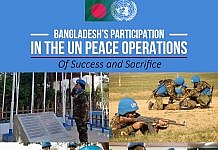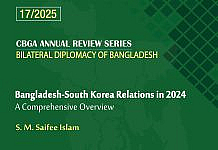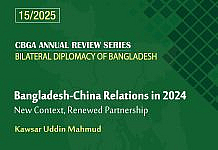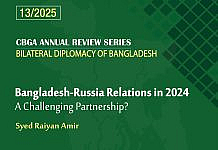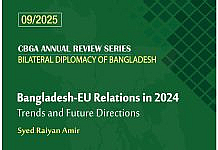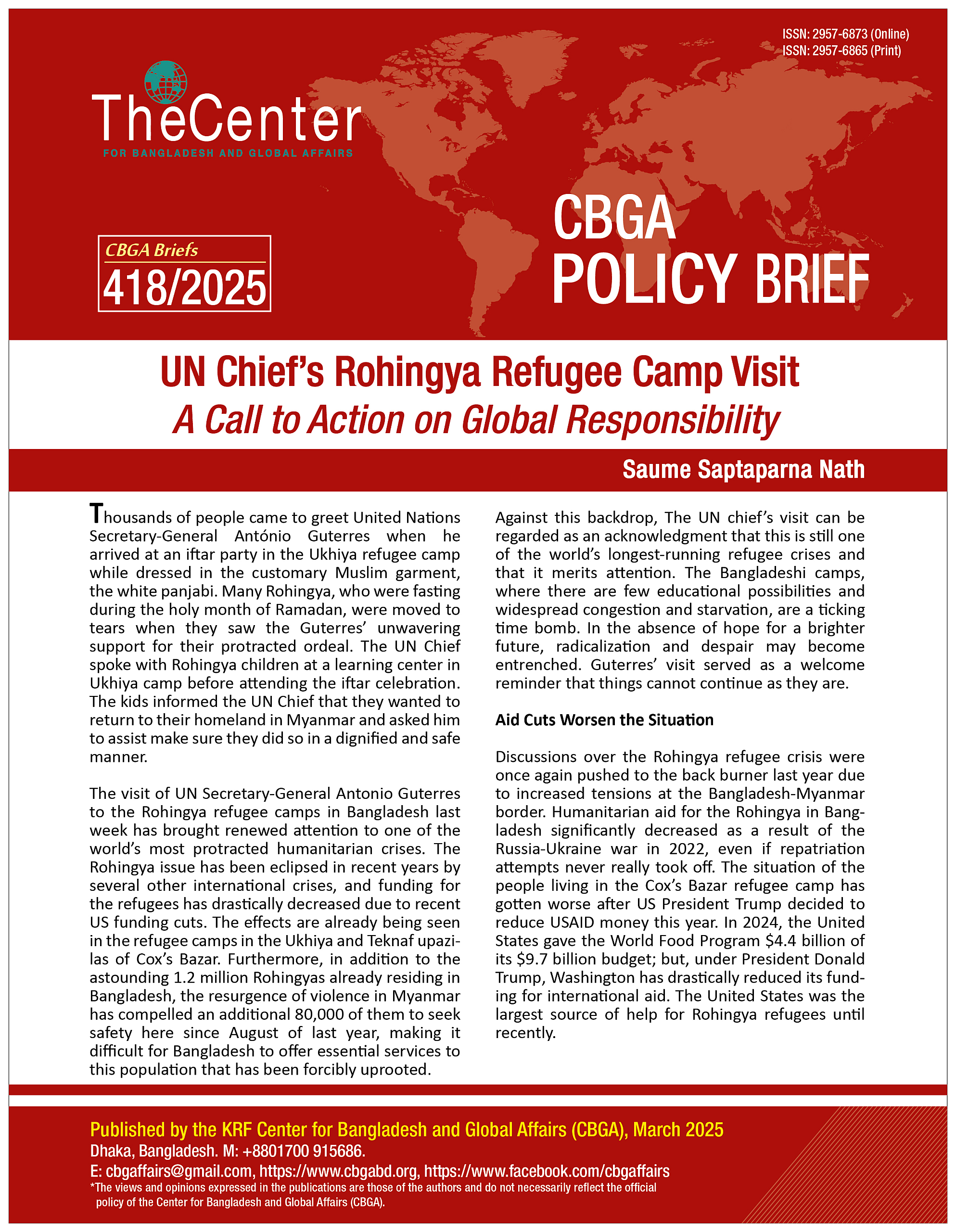
Thousands of people came to greet United Nations Secretary-General António Guterres when he arrived at an iftar party in the Ukhiya refugee camp while dressed in the customary Muslim garment, the white panjabi. Many Rohingya, who were fasting during the holy month of Ramadan, were moved to tears when they saw the Guterres’ unwavering support for their protracted ordeal. The UN Chief spoke with Rohingya children at a learning center in Ukhiya camp before attending the iftar celebration. The kids informed the UN Chief that they wanted to return to their homeland in Myanmar and asked him to assist make sure they did so in a dignified and safe manner.
The visit of UN Secretary-General Antonio Guterres to the Rohingya refugee camps in Bangladesh last week has brought renewed attention to one of the world’s most protracted humanitarian crises. The Rohingya issue has been eclipsed in recent years by several other international crises, and funding for the refugees has drastically decreased due to recent US funding cuts. The effects are already being seen in the refugee camps in the Ukhiya and Teknaf upazilas of Cox’s Bazar. Furthermore, in addition to the astounding 1.2 million Rohingyas already residing in Bangladesh, the resurgence of violence in Myanmar has compelled an additional 80,000 of them to seek safety here since August of last year, making it difficult for Bangladesh to offer essential services to this population that has been forcibly uprooted.
Against this backdrop, The UN chief’s visit can be regarded as an acknowledgment that this is still one of the world’s longest-running refugee crises and that it merits attention. The Bangladeshi camps, where there are few educational possibilities and widespread congestion and starvation, are a ticking time bomb. In the absence of hope for a brighter future, radicalization and despair may become entrenched. Guterres’ visit served as a welcome reminder that things cannot continue as they are.
Aid Cuts Worsen the Situation
Discussions over the Rohingya refugee crisis were once again pushed to the back burner last year due to increased tensions at the Bangladesh-Myanmar border. Humanitarian aid for the Rohingya in Bangladesh significantly decreased as a result of the Russia-Ukraine war in 2022, even if repatriation attempts never really took off. The situation of the people living in the Cox’s Bazar refugee camp has gotten worse after US President Trump decided to reduce USAID money this year. In 2024, the United States gave the World Food Program $4.4 billion of its $9.7 billion budget; but, under President Donald Trump, Washington has drastically reduced its funding for international aid. The United States was the largest source of help for Rohingya refugees until recently.
The situation facing the Rohingya refugees in the camps in Cox’s Bazar is going to get worse than it has been. The UN World Food Programme (WFP) has decided to cut monthly food assistance for Rohingya refugees in Bangladesh in half, from $12.50 per person to just $6, starting next month due to funding shortages. In actuality, $6 a month is only roughly Tk 24 per day, insufficient to buy an egg and a banana. It is unclear from Bangladesh’s recent economic health card that the host nation can support these stateless persons for an extended period without outside help. Malnutrition is likely to result from the funding loss, which has considerably more serious repercussions. Aid workers and Rohingya leaders have already expressed their worries that the hopelessness will probably encourage militancy.
Thousands of refugees have already been reported to have turned to armed conflict as a result of their frustration with poverty, inactivity, and insecurity. According to a Reuters investigation conducted last year, 3,000 to 5,000 Rohingya fighters have been recruited from the refugee camps because the prospect of money or purpose has attracted many disillusioned young men. While some participated in gang violence inside the camps, some even joined groups that supported their former persecutors in their struggle against ethnic insurgents. The living conditions in the camps were depicted in a recent study by the Refugee and Migratory Movements Research Unit, which also raised security issues and gender-based violence. Repatriation efforts are also being hampered by Myanmar’s continuous turmoil and instability. There has been very little progress in the Office of the UN High Commissioner for Refugees (UNHCR) efforts to repatriate Rohingya. The issue on Bangladesh’s end will be made worse by the lack of legitimacy and financial constraints. This will simply exacerbate the previously identified security issues.
Hope Rekindles Once Again
As Bangladesh struggles with both internal and external obstacles meant to impede the historic reforms implemented by Nobel Peace Prize laureate Dr. Muhammad Yunus’ interim government, Guterres’ visit came at a crucial moment. To provide the conditions for the Rohingya to return in dignity, Guterres called on all parties in Myanmar to put the safety of the people first, stop additional bloodshed, and clear the path for democracy. On or before Eid al-Fitr in 2026, the UN and Bangladesh want to repatriate refugees to Myanmar. The need for a new strategy that incorporates regional cooperation and increased international accountability is highlighted by Guterres’ unambiguous call for repatriation.
To address the humanitarian needs in Myanmar, and specifically in Rakhine State, Guterres suggested creating a humanitarian corridor between Rakhine State and Bangladesh. This would make it easier to deliver aid to communities in Myanmar and, in turn, improve conditions there so that later repatriation would be possible. Guterres proposed the United League of Arakan/Arakan Army (ULA/AA) as an essential discussion partner to accomplish this objective. Guterres’ statements were a blatant indication. The top diplomat in the world clearly outlined the requirements that the Arakan Army and other Myanmar authorities must fulfill to be recognized internationally. A non-negotiable standard must be the Rohingya’s voluntary, secure, and dignified return, with full acknowledgment of their identity and rights. Additionally, it is expected that he will leverage his office and personal connections to increase the diminishing humanitarian assistance for the Rohingya.
A Key Diplomatic Moment for Bangladesh
For Bangladesh, which has shouldered the immense burden of hosting nearly a million refugees, this declaration marks a significant diplomatic victory. No significant progress has been made despite numerous bilateral agreements with Myanmar. The unsuccessful 2018 and 2019 repatriation attempts served as a grim reminder that the Rohingya would continue to be in danger in the absence of assurances of safety and citizenship. Rohingya refugees saw Bangladesh Chief Adviser Prof. Yunus’ address in the local tongue following Friday’s iftar as a show of unity. “The UN Secretary-General has arrived to alleviate the Rohingyas’ suffering. I hope the Rohingyas will be allowed to spend their Eid in their homeland the following year, but not this year. If necessary, he continued, they will have to fight the entire globe to return the Rohingyas to their homeland. “People visit the graves of their closest relatives during Eid. The chief adviser for Bangladesh stated that the Rohingyas are not even afforded that chance. In Bangladesh, where resentment over the delayed repatriation process has increased, this message strikes a deep chord.
By learning from Gaza’s experience with food and financial shortages and their cascading effects, it is hoped that the UN secretary-general’s iftar in the Rohingya camps would enable him to play a more balanced role. Guterres’ visit will contribute to the urgent resolution of the Rohingya issue, allowing them to return to Myanmar in safety and recognition. In addition to providing humanitarian assistance, the UN must look for long-term solutions, protect the rights of refugees, address community concerns, and put pressure on Myanmar to repatriate refugees in a meaningful way. The secretary-general’s support provides a ray of hope for the Rohingya themselves. Hearing the world’s top diplomat reiterate their right to return with dignity after years of marginalization and quiet is a potent acknowledgment of their struggle. But words need to be turned into action. The Rohingya are entitled to observable advancements in the restoration of their rights and safe repatriation. Additionally, the Rohingya’s predicament has to continue to be a top priority on the international humanitarian agenda.
– Saume Saptaparna Nath is a Research Associate at the KRF Center for Bangladesh and Global Affairs (CBGA). She is on Study Leave for Pursuing Her Higher Studies in Japan.


